A Comprehensive Review of the Evolution of CSR Theories and Business
VerifiedAdded on 2023/06/10
|7
|1329
|167
Essay
AI Summary
This paper provides an overview of Corporate Social Responsibility (CSR) theories, tracing their conceptual development from the 1950s to the present. It highlights the shift from a focus on social effects to organizational-level analysis and the impact of CSR on business performance. The essay discusses the ethical obligations of businesses, the role of stakeholders, and the strategic implications of CSR in the 1990s and beyond. It emphasizes the increasing importance of CSR in enhancing corporate financial performance and promoting sustainability, while also acknowledging the challenges and limitations of CSR initiatives. The document concludes that CSR plays a vital role in balancing the relationship between countries and the rapid globalization of the economy. Desklib is a platform where students can find similar solved assignments and study resources to aid in their academic pursuits.
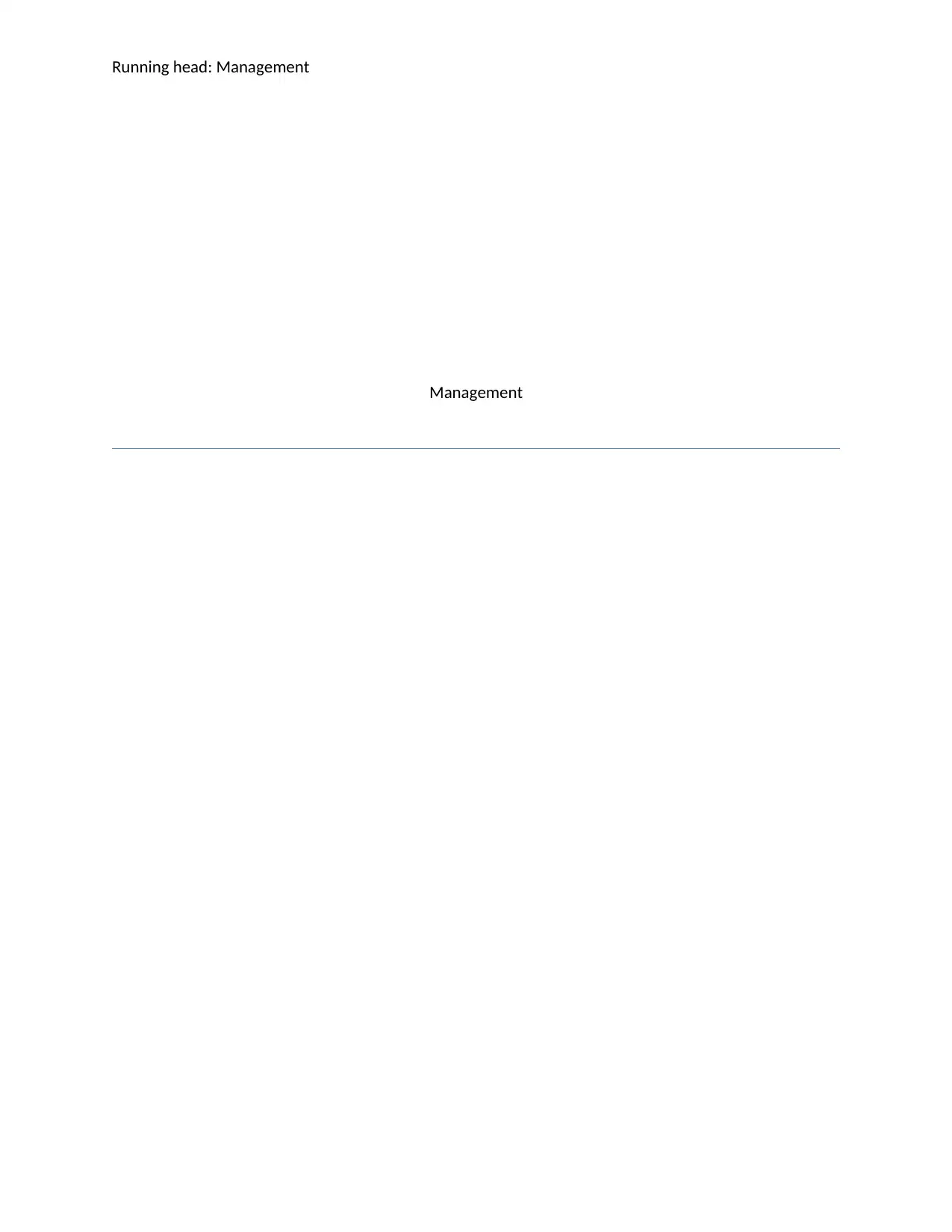
Running head: Management
Management
Management
Paraphrase This Document
Need a fresh take? Get an instant paraphrase of this document with our AI Paraphraser
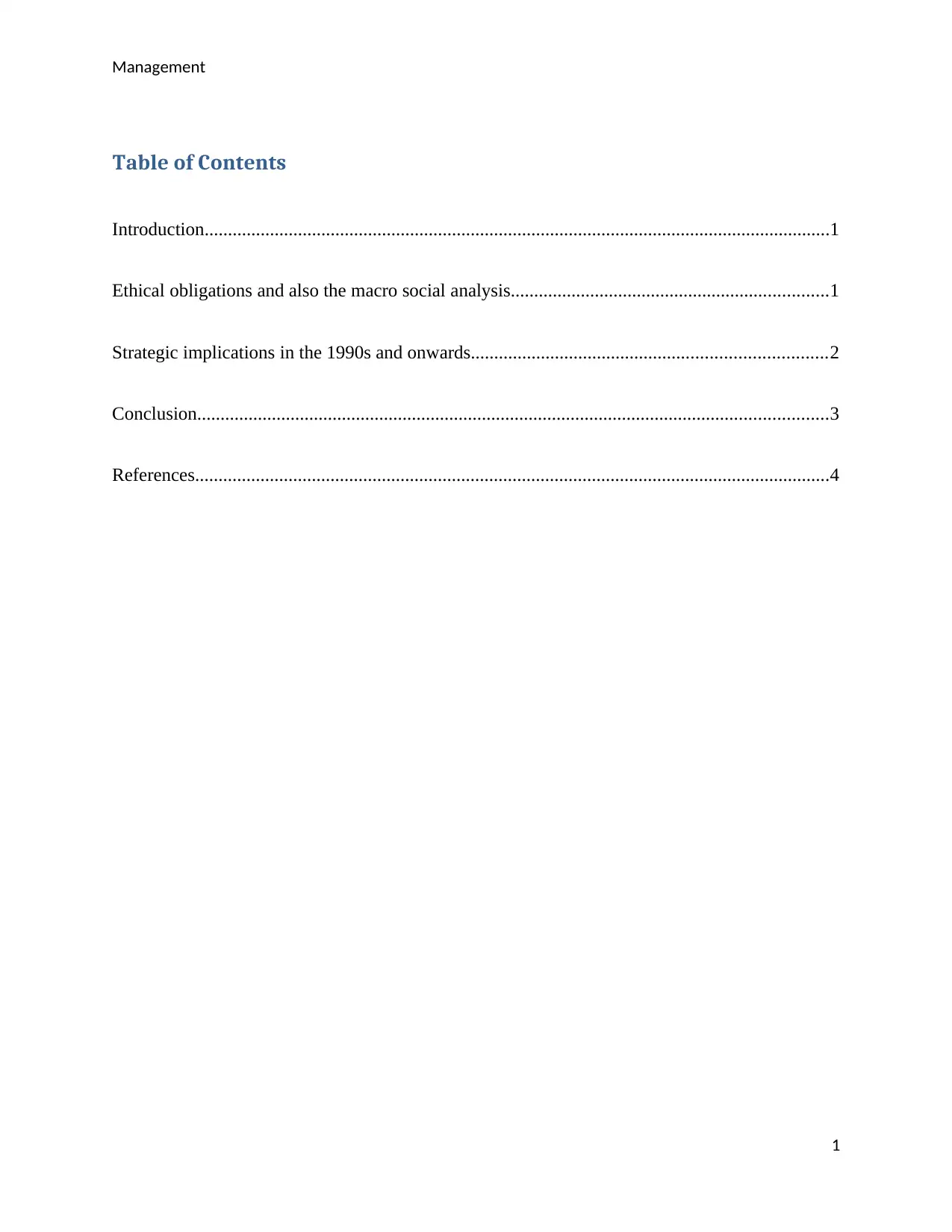
Management
Table of Contents
Introduction......................................................................................................................................1
Ethical obligations and also the macro social analysis....................................................................1
Strategic implications in the 1990s and onwards............................................................................2
Conclusion.......................................................................................................................................3
References........................................................................................................................................4
1
Table of Contents
Introduction......................................................................................................................................1
Ethical obligations and also the macro social analysis....................................................................1
Strategic implications in the 1990s and onwards............................................................................2
Conclusion.......................................................................................................................................3
References........................................................................................................................................4
1
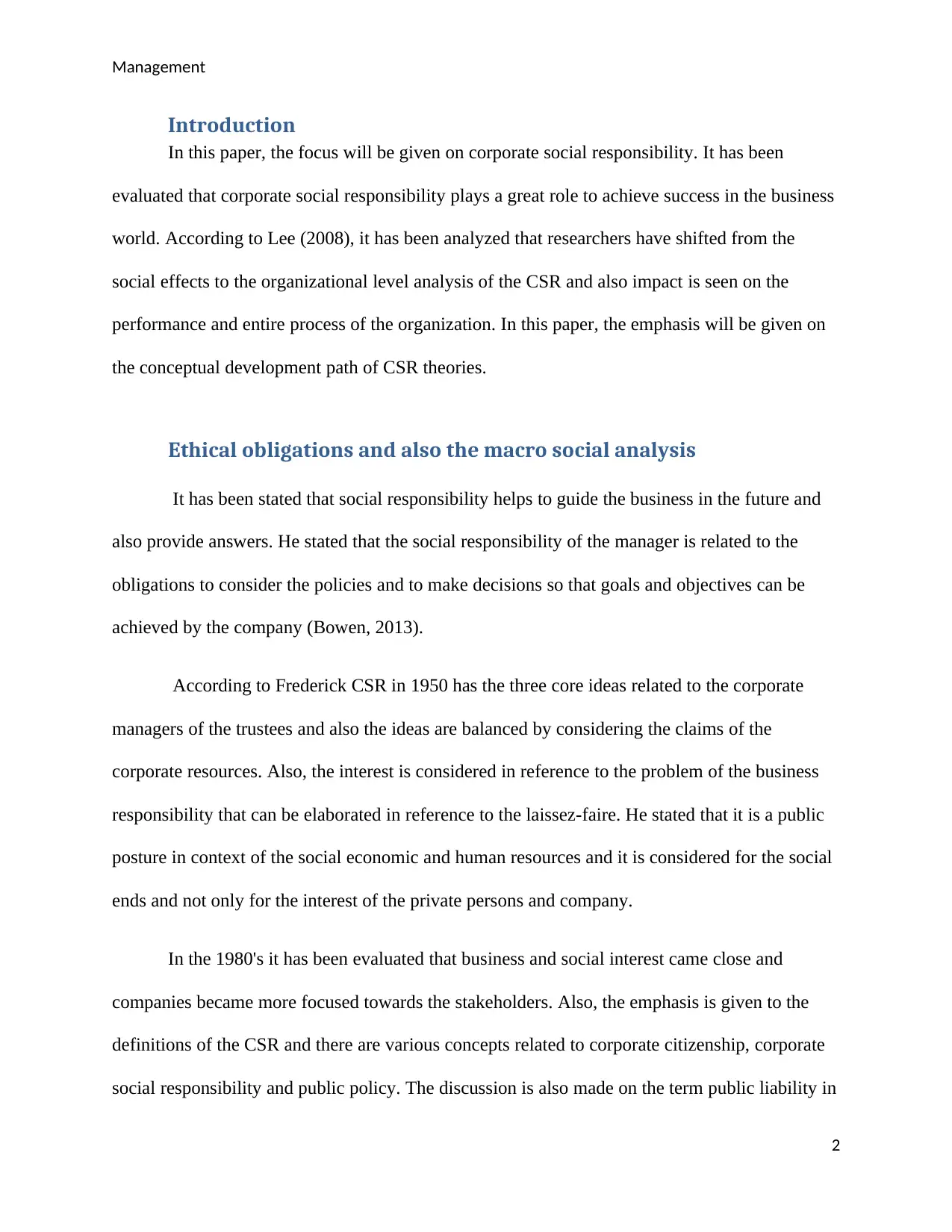
Management
Introduction
In this paper, the focus will be given on corporate social responsibility. It has been
evaluated that corporate social responsibility plays a great role to achieve success in the business
world. According to Lee (2008), it has been analyzed that researchers have shifted from the
social effects to the organizational level analysis of the CSR and also impact is seen on the
performance and entire process of the organization. In this paper, the emphasis will be given on
the conceptual development path of CSR theories.
Ethical obligations and also the macro social analysis
It has been stated that social responsibility helps to guide the business in the future and
also provide answers. He stated that the social responsibility of the manager is related to the
obligations to consider the policies and to make decisions so that goals and objectives can be
achieved by the company (Bowen, 2013).
According to Frederick CSR in 1950 has the three core ideas related to the corporate
managers of the trustees and also the ideas are balanced by considering the claims of the
corporate resources. Also, the interest is considered in reference to the problem of the business
responsibility that can be elaborated in reference to the laissez-faire. He stated that it is a public
posture in context of the social economic and human resources and it is considered for the social
ends and not only for the interest of the private persons and company.
In the 1980's it has been evaluated that business and social interest came close and
companies became more focused towards the stakeholders. Also, the emphasis is given to the
definitions of the CSR and there are various concepts related to corporate citizenship, corporate
social responsibility and public policy. The discussion is also made on the term public liability in
2
Introduction
In this paper, the focus will be given on corporate social responsibility. It has been
evaluated that corporate social responsibility plays a great role to achieve success in the business
world. According to Lee (2008), it has been analyzed that researchers have shifted from the
social effects to the organizational level analysis of the CSR and also impact is seen on the
performance and entire process of the organization. In this paper, the emphasis will be given on
the conceptual development path of CSR theories.
Ethical obligations and also the macro social analysis
It has been stated that social responsibility helps to guide the business in the future and
also provide answers. He stated that the social responsibility of the manager is related to the
obligations to consider the policies and to make decisions so that goals and objectives can be
achieved by the company (Bowen, 2013).
According to Frederick CSR in 1950 has the three core ideas related to the corporate
managers of the trustees and also the ideas are balanced by considering the claims of the
corporate resources. Also, the interest is considered in reference to the problem of the business
responsibility that can be elaborated in reference to the laissez-faire. He stated that it is a public
posture in context of the social economic and human resources and it is considered for the social
ends and not only for the interest of the private persons and company.
In the 1980's it has been evaluated that business and social interest came close and
companies became more focused towards the stakeholders. Also, the emphasis is given to the
definitions of the CSR and there are various concepts related to corporate citizenship, corporate
social responsibility and public policy. The discussion is also made on the term public liability in
2
⊘ This is a preview!⊘
Do you want full access?
Subscribe today to unlock all pages.

Trusted by 1+ million students worldwide
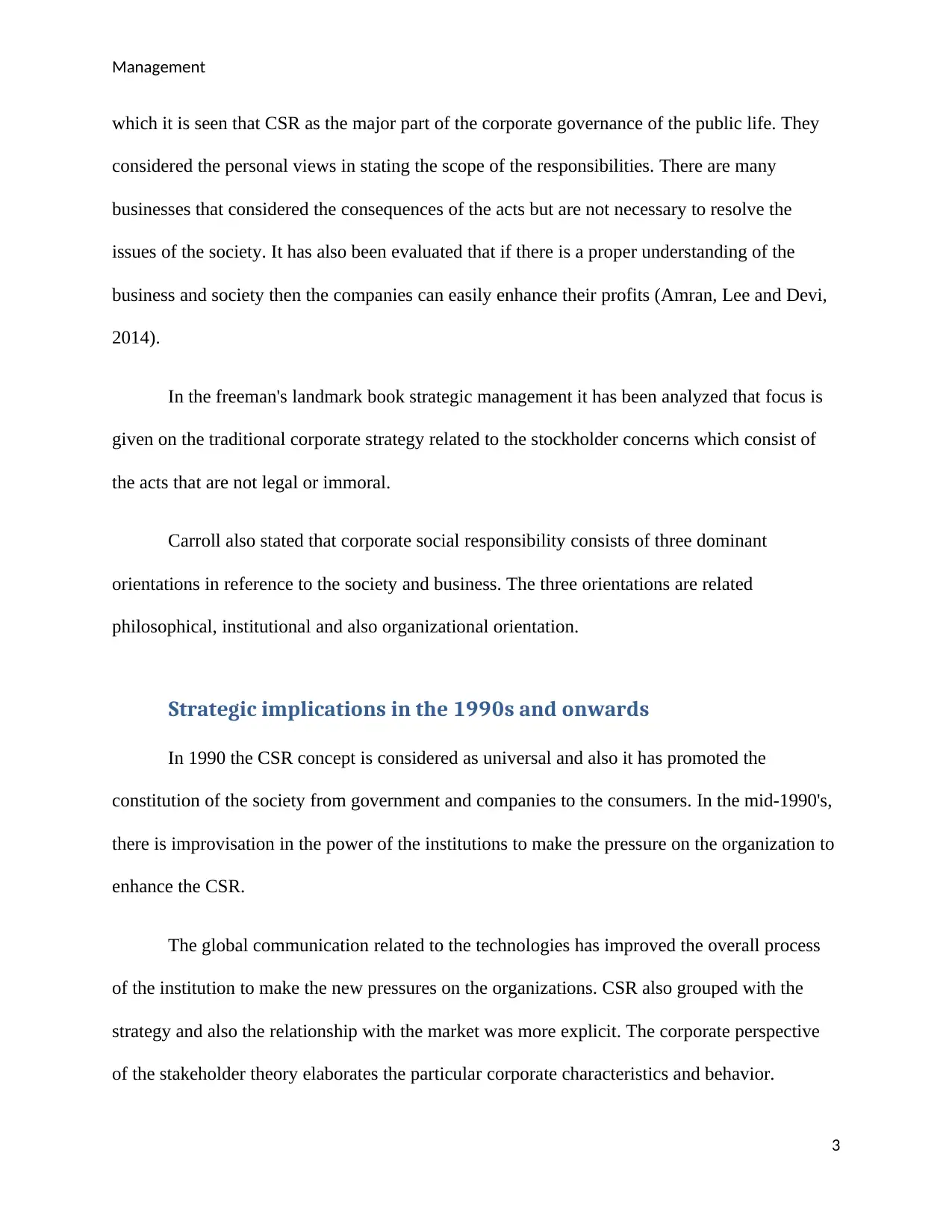
Management
which it is seen that CSR as the major part of the corporate governance of the public life. They
considered the personal views in stating the scope of the responsibilities. There are many
businesses that considered the consequences of the acts but are not necessary to resolve the
issues of the society. It has also been evaluated that if there is a proper understanding of the
business and society then the companies can easily enhance their profits (Amran, Lee and Devi,
2014).
In the freeman's landmark book strategic management it has been analyzed that focus is
given on the traditional corporate strategy related to the stockholder concerns which consist of
the acts that are not legal or immoral.
Carroll also stated that corporate social responsibility consists of three dominant
orientations in reference to the society and business. The three orientations are related
philosophical, institutional and also organizational orientation.
Strategic implications in the 1990s and onwards
In 1990 the CSR concept is considered as universal and also it has promoted the
constitution of the society from government and companies to the consumers. In the mid-1990's,
there is improvisation in the power of the institutions to make the pressure on the organization to
enhance the CSR.
The global communication related to the technologies has improved the overall process
of the institution to make the new pressures on the organizations. CSR also grouped with the
strategy and also the relationship with the market was more explicit. The corporate perspective
of the stakeholder theory elaborates the particular corporate characteristics and behavior.
3
which it is seen that CSR as the major part of the corporate governance of the public life. They
considered the personal views in stating the scope of the responsibilities. There are many
businesses that considered the consequences of the acts but are not necessary to resolve the
issues of the society. It has also been evaluated that if there is a proper understanding of the
business and society then the companies can easily enhance their profits (Amran, Lee and Devi,
2014).
In the freeman's landmark book strategic management it has been analyzed that focus is
given on the traditional corporate strategy related to the stockholder concerns which consist of
the acts that are not legal or immoral.
Carroll also stated that corporate social responsibility consists of three dominant
orientations in reference to the society and business. The three orientations are related
philosophical, institutional and also organizational orientation.
Strategic implications in the 1990s and onwards
In 1990 the CSR concept is considered as universal and also it has promoted the
constitution of the society from government and companies to the consumers. In the mid-1990's,
there is improvisation in the power of the institutions to make the pressure on the organization to
enhance the CSR.
The global communication related to the technologies has improved the overall process
of the institution to make the new pressures on the organizations. CSR also grouped with the
strategy and also the relationship with the market was more explicit. The corporate perspective
of the stakeholder theory elaborates the particular corporate characteristics and behavior.
3
Paraphrase This Document
Need a fresh take? Get an instant paraphrase of this document with our AI Paraphraser
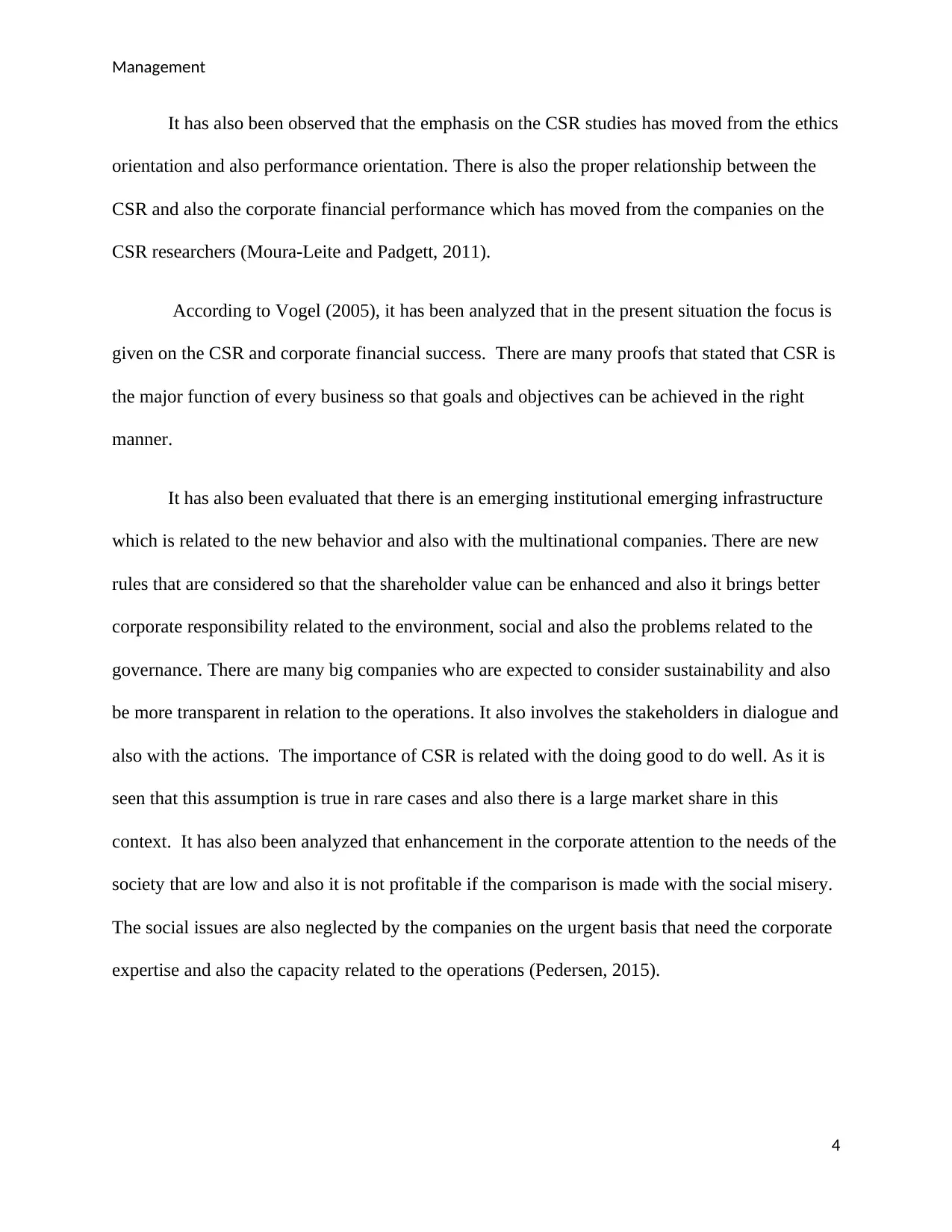
Management
It has also been observed that the emphasis on the CSR studies has moved from the ethics
orientation and also performance orientation. There is also the proper relationship between the
CSR and also the corporate financial performance which has moved from the companies on the
CSR researchers (Moura-Leite and Padgett, 2011).
According to Vogel (2005), it has been analyzed that in the present situation the focus is
given on the CSR and corporate financial success. There are many proofs that stated that CSR is
the major function of every business so that goals and objectives can be achieved in the right
manner.
It has also been evaluated that there is an emerging institutional emerging infrastructure
which is related to the new behavior and also with the multinational companies. There are new
rules that are considered so that the shareholder value can be enhanced and also it brings better
corporate responsibility related to the environment, social and also the problems related to the
governance. There are many big companies who are expected to consider sustainability and also
be more transparent in relation to the operations. It also involves the stakeholders in dialogue and
also with the actions. The importance of CSR is related with the doing good to do well. As it is
seen that this assumption is true in rare cases and also there is a large market share in this
context. It has also been analyzed that enhancement in the corporate attention to the needs of the
society that are low and also it is not profitable if the comparison is made with the social misery.
The social issues are also neglected by the companies on the urgent basis that need the corporate
expertise and also the capacity related to the operations (Pedersen, 2015).
4
It has also been observed that the emphasis on the CSR studies has moved from the ethics
orientation and also performance orientation. There is also the proper relationship between the
CSR and also the corporate financial performance which has moved from the companies on the
CSR researchers (Moura-Leite and Padgett, 2011).
According to Vogel (2005), it has been analyzed that in the present situation the focus is
given on the CSR and corporate financial success. There are many proofs that stated that CSR is
the major function of every business so that goals and objectives can be achieved in the right
manner.
It has also been evaluated that there is an emerging institutional emerging infrastructure
which is related to the new behavior and also with the multinational companies. There are new
rules that are considered so that the shareholder value can be enhanced and also it brings better
corporate responsibility related to the environment, social and also the problems related to the
governance. There are many big companies who are expected to consider sustainability and also
be more transparent in relation to the operations. It also involves the stakeholders in dialogue and
also with the actions. The importance of CSR is related with the doing good to do well. As it is
seen that this assumption is true in rare cases and also there is a large market share in this
context. It has also been analyzed that enhancement in the corporate attention to the needs of the
society that are low and also it is not profitable if the comparison is made with the social misery.
The social issues are also neglected by the companies on the urgent basis that need the corporate
expertise and also the capacity related to the operations (Pedersen, 2015).
4
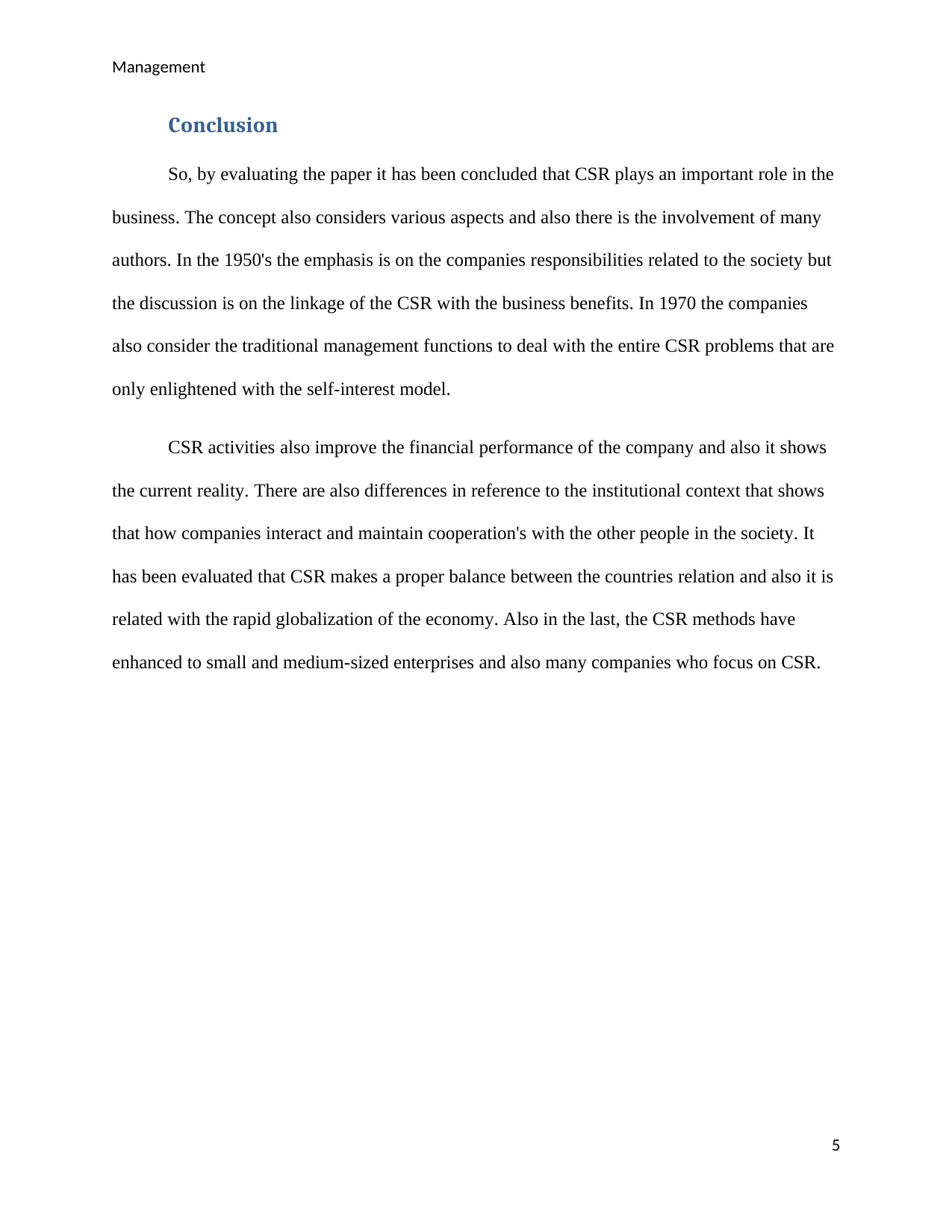
Management
Conclusion
So, by evaluating the paper it has been concluded that CSR plays an important role in the
business. The concept also considers various aspects and also there is the involvement of many
authors. In the 1950's the emphasis is on the companies responsibilities related to the society but
the discussion is on the linkage of the CSR with the business benefits. In 1970 the companies
also consider the traditional management functions to deal with the entire CSR problems that are
only enlightened with the self-interest model.
CSR activities also improve the financial performance of the company and also it shows
the current reality. There are also differences in reference to the institutional context that shows
that how companies interact and maintain cooperation's with the other people in the society. It
has been evaluated that CSR makes a proper balance between the countries relation and also it is
related with the rapid globalization of the economy. Also in the last, the CSR methods have
enhanced to small and medium-sized enterprises and also many companies who focus on CSR.
5
Conclusion
So, by evaluating the paper it has been concluded that CSR plays an important role in the
business. The concept also considers various aspects and also there is the involvement of many
authors. In the 1950's the emphasis is on the companies responsibilities related to the society but
the discussion is on the linkage of the CSR with the business benefits. In 1970 the companies
also consider the traditional management functions to deal with the entire CSR problems that are
only enlightened with the self-interest model.
CSR activities also improve the financial performance of the company and also it shows
the current reality. There are also differences in reference to the institutional context that shows
that how companies interact and maintain cooperation's with the other people in the society. It
has been evaluated that CSR makes a proper balance between the countries relation and also it is
related with the rapid globalization of the economy. Also in the last, the CSR methods have
enhanced to small and medium-sized enterprises and also many companies who focus on CSR.
5
⊘ This is a preview!⊘
Do you want full access?
Subscribe today to unlock all pages.

Trusted by 1+ million students worldwide
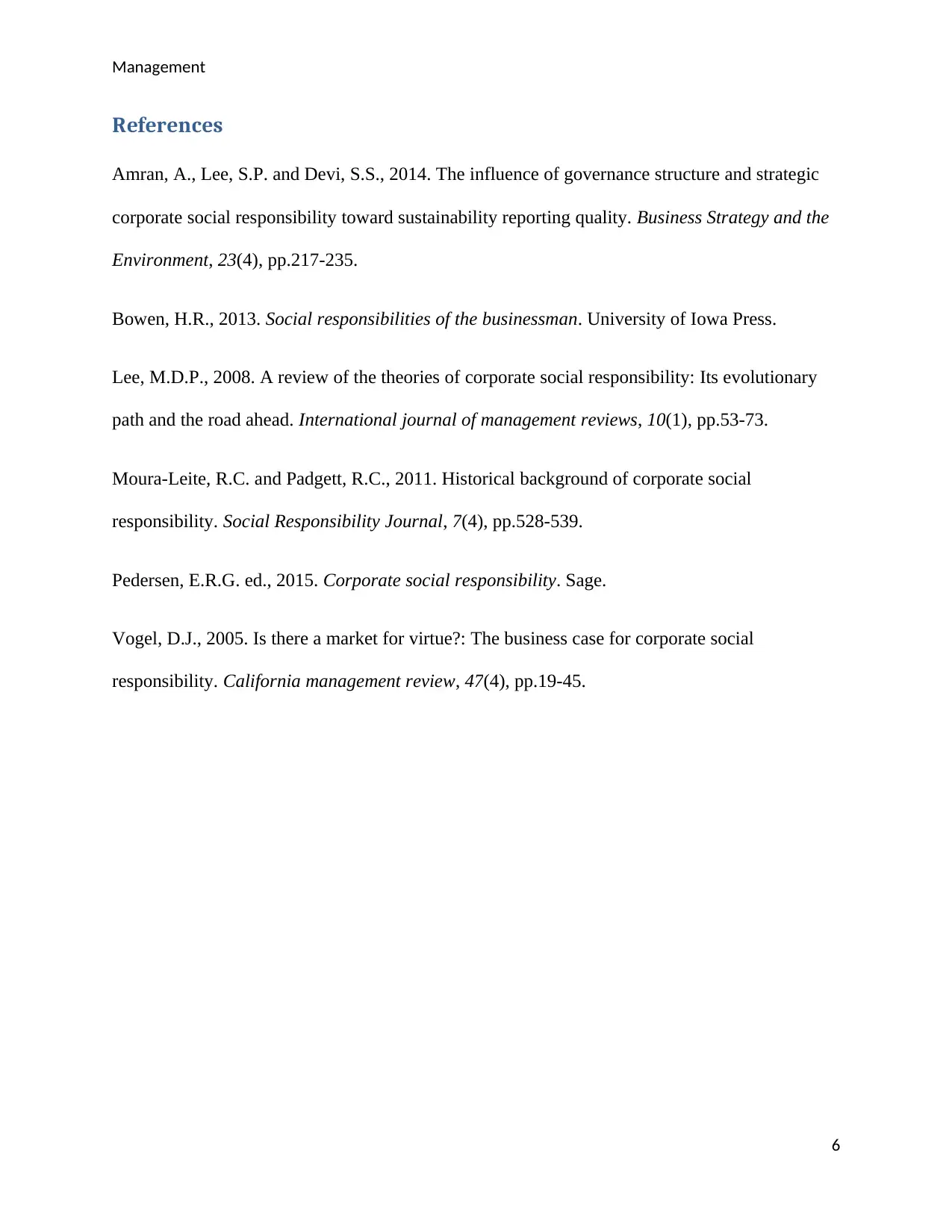
Management
References
Amran, A., Lee, S.P. and Devi, S.S., 2014. The influence of governance structure and strategic
corporate social responsibility toward sustainability reporting quality. Business Strategy and the
Environment, 23(4), pp.217-235.
Bowen, H.R., 2013. Social responsibilities of the businessman. University of Iowa Press.
Lee, M.D.P., 2008. A review of the theories of corporate social responsibility: Its evolutionary
path and the road ahead. International journal of management reviews, 10(1), pp.53-73.
Moura-Leite, R.C. and Padgett, R.C., 2011. Historical background of corporate social
responsibility. Social Responsibility Journal, 7(4), pp.528-539.
Pedersen, E.R.G. ed., 2015. Corporate social responsibility. Sage.
Vogel, D.J., 2005. Is there a market for virtue?: The business case for corporate social
responsibility. California management review, 47(4), pp.19-45.
6
References
Amran, A., Lee, S.P. and Devi, S.S., 2014. The influence of governance structure and strategic
corporate social responsibility toward sustainability reporting quality. Business Strategy and the
Environment, 23(4), pp.217-235.
Bowen, H.R., 2013. Social responsibilities of the businessman. University of Iowa Press.
Lee, M.D.P., 2008. A review of the theories of corporate social responsibility: Its evolutionary
path and the road ahead. International journal of management reviews, 10(1), pp.53-73.
Moura-Leite, R.C. and Padgett, R.C., 2011. Historical background of corporate social
responsibility. Social Responsibility Journal, 7(4), pp.528-539.
Pedersen, E.R.G. ed., 2015. Corporate social responsibility. Sage.
Vogel, D.J., 2005. Is there a market for virtue?: The business case for corporate social
responsibility. California management review, 47(4), pp.19-45.
6
1 out of 7
Related Documents
Your All-in-One AI-Powered Toolkit for Academic Success.
+13062052269
info@desklib.com
Available 24*7 on WhatsApp / Email
![[object Object]](/_next/static/media/star-bottom.7253800d.svg)
Unlock your academic potential
Copyright © 2020–2026 A2Z Services. All Rights Reserved. Developed and managed by ZUCOL.





